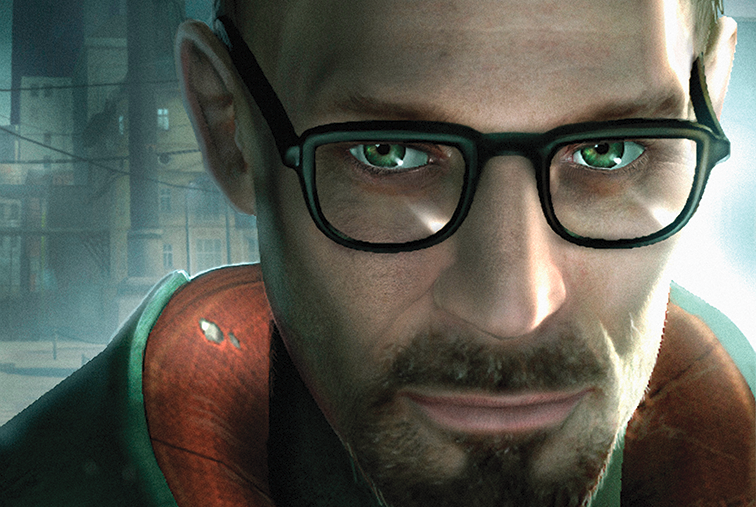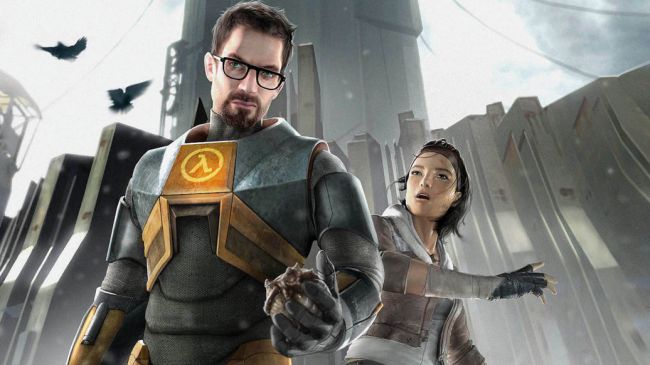
Update: He do still need Half-Life 3, but in the meantime Valve has announced a new VR prequel game called Half-Life: Alyx coming in 2020.
Tom Senior: Recently Game Informer disclosed the insights of a supposed Valve insider who insists that Half-Life 3 doesn’t exist in any meaningful form. RTS and FMV prototypes have apparently been toyed with, but the magical genre-shattering FPS sequel that the internet has been craving for nearly a decade isn’t real. Earlier this week Valve’s Gabe Newell did an Ask Me Anything on Reddit and suggested that Valve is still interested in revisiting the Half-Life universe, though “the number three must not be said.” Don’t hold your breath, basically.
Valve’s failure to release Half-Life 3 is not surprising because Valve has never announced Half-Life 3. The studio wanted to move from huge boxed releases to shorter development cycles and an episodic format, culminating with Half-Life 2: Episode Three. Episode Two ended on a savage cliffhanger, but that alone doesn’t fully explain why we want more Half-Life 10 years later. Half-Life 3 has taken on additional meaning. "HL3 confirmed!??" is a running gag, but a hopeful one. We want to believe.
For me Half-Life 3's absence feels like a symbol of Valve’s retreat from game development. I know this is ridiculous, because Valve is running Dota 2 and Counter-Strike: Global Offensive—two of the biggest games in the world. But I can’t enjoy Dota 2, because a) it demands massive time investment and b) in my experience as a new player in that community has been dreadful. I don't think I'm alone. I loved Left 4 Dead and Portal, and I had a great time with Alien Swarm, which Valve put out for free in 2010. I miss Valve’s humour and innovation, but if I’m honest I’m pining for Half-Life because Valve stopped making games for me. That’s a pretty petulant position, but there we are.
Samuel Roberts: I've always speculated that an unspoken reason behind Half-Life 3's continued non-existence is the burden to reinvent the first-person shooter again, just as Valve had done on two previous occasions. Is it enough for Valve to just make a super refined sequel, even if it doesn't have the impact of either of the previous Half-Life games? Well, yes—Portal 2 is exactly that model of follow-up. It wasn't a reinvention, it was a welcome extension of the first game's existing ideas. If the level and narrative design is strong enough, it doesn't feel like diminishing returns.
We need Half-Life 3 to complete the story of the series, but more than that, it's a better world for having more of Valve's single-player games in it.
Tom S: It is unfortunate that Half-Life 3 (or Half-Life 3: Episode Three) has become this mythical entity. We don't know what it looks like but it's everything we have ever dreamed a first-person game could be. That impossible expectation is good enough reason never to touch that series again. We've been banging on about it for so long that the stakes are crazy high now (and we are not going to stop, apparently).
Keep up to date with the most important stories and the best deals, as picked by the PC Gamer team.
Also shooters are in a good place right now. Last year brought us Doom, Titanfall 2, Battlefield 1’s Operations mode, Overwatch, and Rainbow Six Siege is ticking along nicely. If the rumours are true we could be looking at Destiny 2 on PC in the future. I’m hoping for another shooter from the Wolfenstein: The New Order team. I miss the jokes and the characters of the Half-Life universe, but the FPS hardly needs to be rescued.

Phil Savage: The thing with Portal 2, Sam, is that it did reinvent—just not the campaign. Through its level editor, It made Steam Workshop creation accessible to everyone, and not just people who are really good at making virtual hats. It worked! Portal 2's Workshop page contains over 557,000 items, and, while most of those will have never been played, it definitely extended the life of an otherwise unsurprising—albeit hilarious and with a better ending song—sequel.
I think that's what Gabe Newell meant when he said, in his recent AMA, that Valve's products are, "usually the result of an intersection of technology that we think has traction, a group of people who want to work on that, and one of the game properties that feels like a natural playground for that set of technology and design challenges." If Portal 2 was the Workshop, and Team Fortress 2 the ability to sell a fuckload of hats, what would Half-Life 3 bring to Valve's ecosystem? Maybe it's Source 2. Half-Life 2 was a great showcase for the original Source engine. Perhaps Half-Life 3 will be how Valve demonstrates the power of its successor.
Joe Donnelly: Sam and Tom's points about reinvention and the rude health of modern shooters are bang on the money, and while the FPS genre isn't in need of the same revolution brought by Half-Life 2 12 years ago, Half-Life 2 itself still one of the best first-person shooters on the market today. I revisited the Orange Box last year on a whim to see how Gordon Freeman's second outing fared against today's standards—a whim which had me rooting around Nova Prospekt a full week later, delighting in the how much of the game's wit, humour and expert design I'd forgotten since my first playthroughs.
We've missed this, and it was only by returning after such a long absence that I realised quite how much I miss this. To this end while seeing Half-Life 3—or HL2: Episode 3—powered by Source 2 or something newer would be lovely; I'd just as easy take a concluding chapter powered by the original 2004 engine. And, judging by some of the responses to Gabe Newell's mid-week AMA, I seem to be far from alone. This covers the want element, but do we need Half-Life 3? I reckon yes: evolution and nostalgia aside, denying players the chance to tie up Freeman's loose ends while treating themselves to another helping of what made number two so enjoyable is not only a disservice to players, but an injustice to videogames in general.
Tom S: Some fans have wondered if Valve could do a comic, or another similarly light-touch release, to tie up the end of the story. This seems like a good idea, and I enjoy Valve’s comics a lot.
I do wonder why Half-Life 2’s story still carries weight all this time later though. Half-Life opened with a B-movie premise—experiments gone wrong, the military sweeping in to cover things up. It gained a lot of detail with Half-Life 2, but it’s still pulp sci-fi to me. I mean, there’s a whole zombie movie pastiche in there.

Chris Thursten: Half-Life has always had revolutionary storytelling, but never a revolutionary story. The groundbreaking implementation of elaborate scripted sequences in the first game is why people remember it so vividly. The game never took control away from you: you were there, in Black Mesa, watching that otherwise-familiar B-movie premise explode to life around you.
Half-Life 2 took that further, and grounded a more sophisticated (but still familiar) story of near-future resistance in a believable dystopia. It has been widely imitated, and for good reason. It was a compellingly presented world populated by well-performed characters. Again, you felt like you were in a real place to an extent that you hadn't necessarily been in previous games.
In addition to advancing the FPS as a whole, then, Half-Life 3 would presumably need to advance our understanding of what a gameworld can be. This is where it gets much more complicated, I suspect. The advance of game engine technology has slowed. We're not blown away by see-saw physics any more. I wouldn't be surprised if Valve had experimented with VR with this in mind. Because what else could they do?
Aside from some staggering advance in graphics tech—that would still need to run on regular PCs—the best they could do is kidnap you, stick you in a helicopter, fly you to antarctica and force you to live the conclusion of Gordon's journey in real life. I mean, they could probably afford to do that. But should they? I've seen Westworld. The answer: probably not. (But please do it anyway, Gabe.)
Tom S: That’s settled, then. We do need Half-Life 3, and it needs to be an experiential future-tech extravaganza with deadly IRL headcrabs and reality-shattering see-saw puzzles. Get on it then, Valve.
The collective PC Gamer editorial team worked together to write this article. PC Gamer is the global authority on PC games—starting in 1993 with the magazine, and then in 2010 with this website you're currently reading. We have writers across the US, UK and Australia, who you can read about here.


